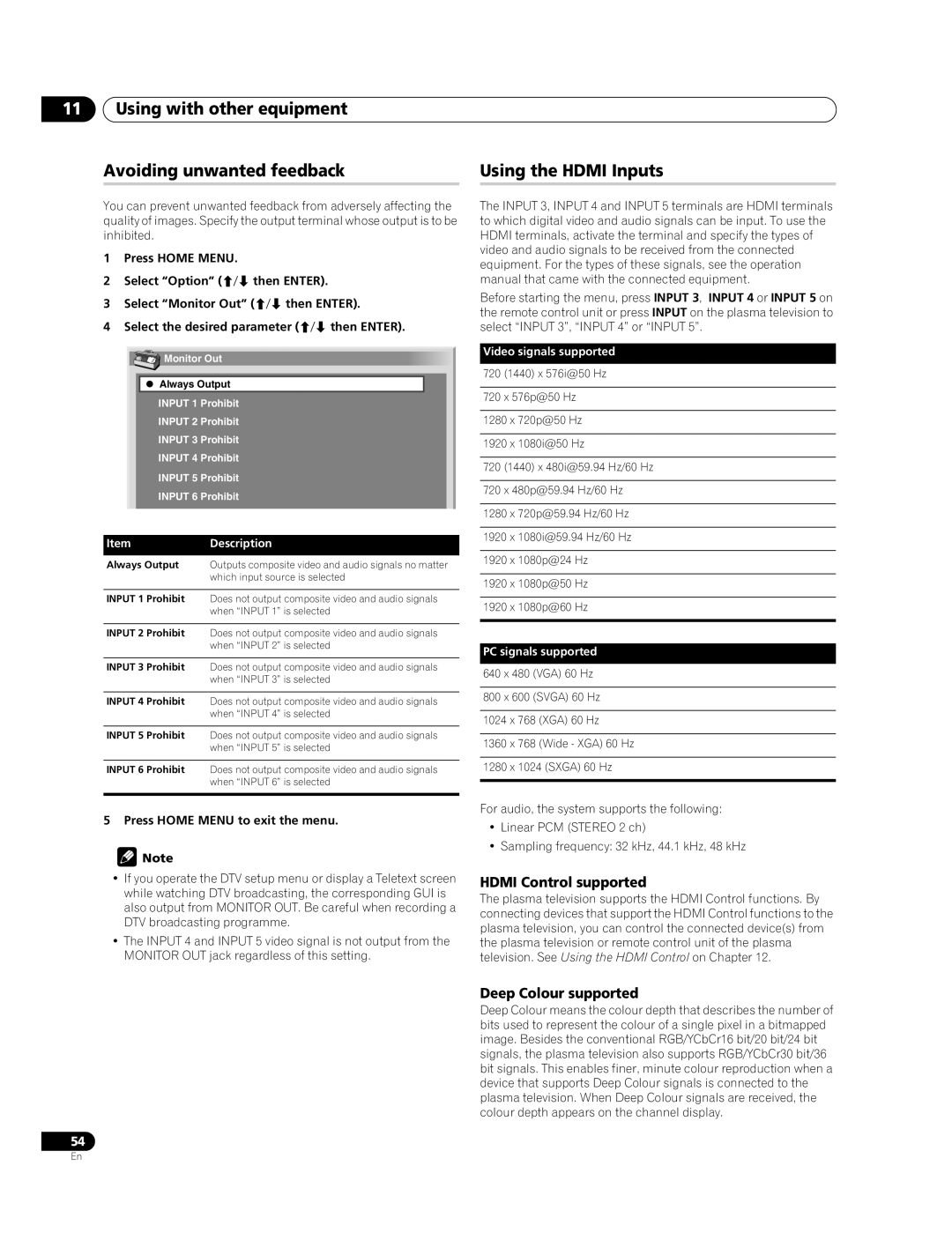
11Using with other equipment
Avoiding unwanted feedback | Using the HDMI Inputs | |
|
|
|
You can prevent unwanted feedback from adversely affecting the quality of images. Specify the output terminal whose output is to be inhibited.
1Press HOME MENU.
2Select “Option” (/ then ENTER).
3Select “Monitor Out” (/ then ENTER).
4Select the desired parameter (/ then ENTER).
![]() Monitor Out
Monitor Out
![]()
![]() Always Output
Always Output
INPUT 1 Prohibit
INPUT 2 Prohibit
INPUT 3 Prohibit
INPUT 4 Prohibit
INPUT 5 Prohibit
INPUT 6 Prohibit
ItemDescription
Always Output Outputs composite video and audio signals no matter
which input source is selected
INPUT 1 Prohibit Does not output composite video and audio signals
when “INPUT 1” is selected
INPUT 2 Prohibit Does not output composite video and audio signals
when “INPUT 2” is selected
INPUT 3 Prohibit Does not output composite video and audio signals
when “INPUT 3” is selected
INPUT 4 Prohibit Does not output composite video and audio signals
when “INPUT 4” is selected
INPUT 5 Prohibit Does not output composite video and audio signals
when “INPUT 5” is selected
INPUT 6 Prohibit Does not output composite video and audio signals
when “INPUT 6” is selected
5 Press HOME MENU to exit the menu.
![]() Note
Note
•If you operate the DTV setup menu or display a Teletext screen while watching DTV broadcasting, the corresponding GUI is also output from MONITOR OUT. Be careful when recording a DTV broadcasting programme.
•The INPUT 4 and INPUT 5 video signal is not output from the MONITOR OUT jack regardless of this setting.
The INPUT 3, INPUT 4 and INPUT 5 terminals are HDMI terminals to which digital video and audio signals can be input. To use the HDMI terminals, activate the terminal and specify the types of video and audio signals to be received from the connected equipment. For the types of these signals, see the operation manual that came with the connected equipment.
Before starting the menu, press INPUT 3, INPUT 4 or INPUT 5 on the remote control unit or press INPUT on the plasma television to select “INPUT 3”, “INPUT 4” or “INPUT 5”.
Video signals supported
720 (1440) x 576i@50 Hz
720 x 576p@50 Hz
1280 x 720p@50 Hz
1920 x 1080i@50 Hz
720 (1440) x 480i@59.94 Hz/60 Hz
720 x 480p@59.94 Hz/60 Hz
1280 x 720p@59.94 Hz/60 Hz
1920 x 1080i@59.94 Hz/60 Hz
1920 x 1080p@24 Hz
1920 x 1080p@50 Hz
1920 x 1080p@60 Hz
PC signals supported
640 x 480 (VGA) 60 Hz
800 x 600 (SVGA) 60 Hz
1024 x 768 (XGA) 60 Hz
1360 x 768 (Wide - XGA) 60 Hz
1280 x 1024 (SXGA) 60 Hz
For audio, the system supports the following:
•Linear PCM (STEREO 2 ch)
•Sampling frequency: 32 kHz, 44.1 kHz, 48 kHz
HDMI Control supported
The plasma television supports the HDMI Control functions. By connecting devices that support the HDMI Control functions to the plasma television, you can control the connected device(s) from the plasma television or remote control unit of the plasma television. See Using the HDMI Control on Chapter 12.
Deep Colour supported
Deep Colour means the colour depth that describes the number of bits used to represent the colour of a single pixel in a bitmapped image. Besides the conventional RGB/YCbCr16 bit/20 bit/24 bit signals, the plasma television also supports RGB/YCbCr30 bit/36 bit signals. This enables finer, minute colour reproduction when a device that supports Deep Colour signals is connected to the plasma television. When Deep Colour signals are received, the colour depth appears on the channel display.
54
En
